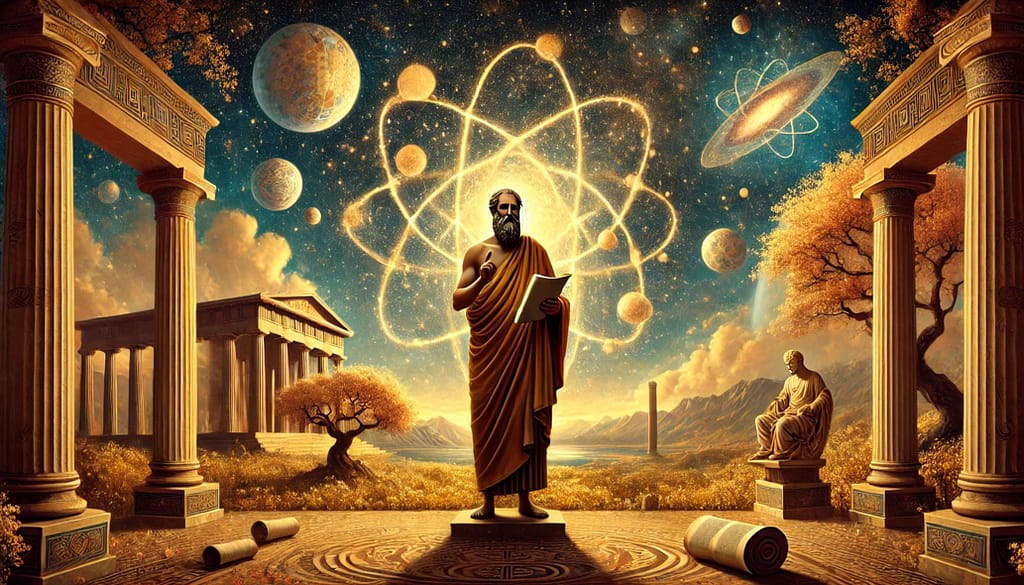Ιn the early 15th century, a man named Poggio Bracciolini set out on a journey that would change the course of history, though he could never have known it at the time. Poggio was not just any traveler; he was a book hunter—a scholar with a deep passion for the wisdom of the ancient world. His quest was to find lost manuscripts, forgotten for centuries, hidden away in the dusty archives of remote monasteries across Europe.

Little did he know that one of these manuscripts would contain the powerful ideas of a long-dead philosopher, Epicurus, and would reignite a philosophical revolution.
It was the winter of 1417 when Poggio, a man in his late thirties, found himself navigating the snow-covered hills and valleys of southern Germany. He was not a soldier, nor a nobleman, but a scriptor—an apostolic secretary who had once served the Pope. His life had taken a turn when his master, Pope John XXIII, was deposed and imprisoned, leaving Poggio without a position or a purpose. But Poggio was not the kind of man to wallow in despair. Instead, he turned to the one thing that had always fascinated him: the pursuit of ancient knowledge.
His destination was a secluded monastery, one of many he had visited in his relentless search for ancient texts. Rumors had reached him that this particular monastery might hold a cache of forgotten manuscripts, and Poggio was determined to see if those rumors were true.
The monastery was cold and silent when Poggio arrived. The monks who lived there were used to visitors, but not of Poggio’s kind. Most came seeking religious guidance or solace, but Poggio’s interests were far more worldly. He requested access to the monastery’s library, a request granted with some reluctance.
The library was a dimly lit room filled with shelves of old books and scrolls, many of them untouched for centuries. The air was thick with the scent of aging parchment, a scent that Poggio found exhilarating. He began his search, sifting through the manuscripts with the practiced care of someone who had done this many times before. His heart pounded with anticipation, knowing that while the odds of finding something extraordinary were slim, the possibility was always there.
And then, buried among the other manuscripts, Poggio found it: a complete copy of “On the Nature of Things” (“De Rerum Natura”) by Lucretius, a Roman poet and philosopher. The manuscript was ancient, fragile, and nearly indecipherable. But Poggio recognized its importance immediately. He could scarcely believe his luck—he had found a complete copy of a work that had been lost to the world for over a thousand years.
Lucretius’ poem was no ordinary text. It was a bold and radical exposition of the philosophy of Epicurus, a Greek thinker whose ideas had once challenged the very foundations of religious and philosophical thought. Epicurus rejected Plato’s and Aristotle’s ideas of inherent purposes in nature (Teleology) and the emphasis on metaphysical concepts. Instead he valued empirical observation and emphasized the role of reason and critical thinking in understanding the world. Through his Empiricism and Rationalism lens he was able to conceive a rational dimension of the world, 2300 years ago.

Epicurus adopted and modified the atomic theory originally proposed by Democritus. He believed that everything in the universe, including the soul, is made up of tiny, indestructible particles called atoms, which move through the void (empty space). He introduced the concept of the “swerve” (clinamen) to address the problem of determinism in atomism. He proposed that, occasionally, atoms deviate slightly from their expected paths in an unpredictable manner. This small deviation is what allows for free will and randomness in the universe, making it possible for humans to exercise agency and avoid the strict determinism that would follow from a purely mechanical universe. He argued that everything, including human life, was the result of these atoms interacting, without any interference from the gods. According to this view, all physical phenomena result from the interactions and combinations of these atoms. He posited that the universe is infinite and contains an infinite number of atoms, leading to the possibility of an infinite number of worlds, some similar to our own and others different. The atomic theory, the infinity of the universe rejected the immortality of the soul and the intervention of Gods on human affairs. In fact, Epicurus believed that the gods, if they existed, were indifferent to human affairs. The ultimate goal of life, according to Epicurus, was to achieve peace of mind (ataraxia) and the absence of pain (aponia), not through divine favor, but through understanding the natural world and accepting its realities.

As Poggio read the manuscript, he realized that he had uncovered not just a poem, but a philosophical treatise that could shake the foundations of contemporary thought and ignite the minds of scholars and thinkers for generations to come. Lucretius’ vivid and poetic rendering of Epicurus’ ideas had the potential to free people from the fear of gods and death, encouraging them to seek happiness through reason and knowledge. It was an advocating for a philosophy of life that encourages people to make the most of their time on Earth, to seek personal fulfillment, and to improve the world around them.
Knowing the explosive potential of these ideas, Poggio ordered the manuscript to be copied, ensuring that its contents would not be lost again. With this single act, Poggio unwittingly set the stage for the Renaissance—a period that would see the rebirth of art, science, and philosophy, all inspired by the rediscovered wisdom of the ancient world.
In that cold, silent monastery, Poggio Bracciolini had found more than just a book. He had found the spark of Epicurean thought—a spark that would ignite minds across Europe and transform the world forever.